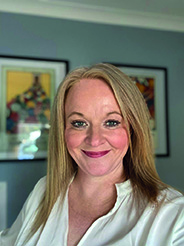Rebecca Dobson studied for a BsC in business information technology. “I was good at chemistry, so I chose something that gave me options,” she says. The degree was focused on software development with “a big emphasis” on international business. “I really enjoyed that combination and the international business context held my focus,” she recalls.
Although marketing was her initial goal, she hated her first job, which was in PR. She was working directly for the company’s CEO, who noticed that she excelled at talking to customers “And I really enjoyed working with them as well. It was his idea for me to move into a sales role, which I really embraced. And I just loved it. I loved the conversation with customers and the opportunity to solve their problems. I really liked the sense of accountability and very clear responsibility to deliver against goals, which is essentially what sales is all about,” she enthuses.
Career development
Since that role, Dobson’s career goal has evolved. It has changed, she says, from an individual approach, which revolved around whatever she could do for the customer by working closely with them, to a broader role, managing teams, moving into new markets and becoming more senior, which gave her insight into different areas of business.
Her career included a 10-year period at Arm, just before the company launched its first dedicated microcontroller products, the M class. The iPhone had been launched only a year beforehand and Dobson remembers the period as “the stage where there was a real intersection of changes within the technology market”.
“Arm taught me about seeking feedback from customers. Every product that we developed came down to a customer conversation, understanding their needs and requirements but also having a vision of where we thought the market would go in the future.
“I think building credibility [as a business and an individual, is]… really important for commercialising emerging applications. You transfer skills and technical capabilities so customers can understand you’ve been successful in one area, and we can help them be successful in another.”
Today students are encouraged to study STEM subjects and employers often advertise for specific qualifications, but working in a technology-driven company without an electronics engineering background has not proved to be a disadvantage, says Dobson.
“Sometimes you can know too much, and if you’re moving into an area that isn’t necessarily based directly on your background, you can get distracted or go down a burrow and get caught up there,” she maintains.
“I think the most important thing is to know what you need to know… If I look at what my job is, it’s to understand value, not to understand features and benefits or to design chips. What does my customer care about? What’s their biggest challenge, and how can we help them solve that? And that challenge should be a business challenge. It could be about productivity.
“At the moment, there’s a massive shortage of engineers, which creates a real challenge for our customers. Cadence can help by utilising the AI and our tools, which help with their productivity, reduced time to market, and eventually cost. It’s all about having confidence in what you bring to the party, knowing that you bring something different, and accepting that you cannot know everything. That’s even more true the more senior you become.”
It was the same at Arm, she says: “I just have to differentiate myself from my peers, many of whom are ex-engineers, bring my value and let that value shine in a different way.”
Covid measures
Dobson joined Cadence Design Systems in January 2020 and we all know what happened shortly after. She had about eight weeks of travelling around and meeting the team before lockdowns came into force. “It was a little bit of a baptism of fire. I had to get to know my team, my job, and my management and deal with a pandemic, so it was a very intense period,” she recalls.
 One of the first places in Europe to be hit by the pandemic was Italy. The Italian office had a high level of infections, but Dobson set up one-to-one meetings with every person in that office to discuss how they were feeling and what they were worried about.
One of the first places in Europe to be hit by the pandemic was Italy. The Italian office had a high level of infections, but Dobson set up one-to-one meetings with every person in that office to discuss how they were feeling and what they were worried about.
“It was at the very raw stage where their neighbours were dying, their relatives were dying. And it was awful. That really helped put some perspective on what we thought was going to then ripple on impact. I was able to share insight from those conversations with my leadership team. Then when Covid was spreading to the next regional office, we had a bit of an idea of what to expect.”
The policy was to communicate and to err on the side of over-communication, says Dobson. It was about leadership rather than management, she says. “We trusted people to get on and do the right thing. And absolutely everybody did.” Round tables were established for as much virtual activity as possible.
A woman’s voice
Dobson is “very comfortable” being the only woman in a meeting, but says the industry needs to increase the number of women in both senior and technical roles. Being the only woman is definitely the norm, she says, but it can be an advantage. “If I’m in a room with another woman, it’s an absolute delight but very unusual, particularly in the sales and customer environment. If you’re the only woman in the room, you’re always remembered. The most important thing is you make sure it’s for the right reasons,” she says.
“If you develop relationships with your customers and you call them, everybody remembers you, whereas I think that’s much more challenging for men. I see it as a real advantage”.
She is also adamant there is no major obstacle to women embarking on, or progressing in a technology-based career today. In fact, she says, it’s the opposite. “Now, every single company wants more women. We’re all fighting over the same tiny pool of brilliant women. The benefits of diversity are broadly acknowledged, and all companies know that they’ve not done a great job for years, and we need to improve our diversity.
“Over the years, I’ve observed many women both inside and outside Cadence, and what seems to be a common obstacle is themselves. Quite often, they’re not necessarily clear on their goals, or pushing themselves forward to take opportunities that are given to them. I think it’s well known that men will look at a job description, and if it’s got one thing they recognise on it, they’ll apply and they know they can do the job, whereas women have to tick every box. Women need to feel much more confident in their abilities because they are brilliant, and they are very, very capable. It’s just making sure that they feel confident enough about it.
“Another obstacle is there are just not enough women, and it’s more about the number of women going into STEM education and STEM careers,” she believes.
Her advice to any young woman considering a sales and marketing role in the electronics industry is: do it. “I think one of the things you need to do is understand your strengths and always play to them. Sales and marketing are very much focused on relationships. Being quite people-orientated and able to build relationships is really critical. Confidence is also really important since you’re going to be presenting a lot, but also coming up with great ideas.
“You need to be tenacious because you need to take ownership and drive things. And also resilient because in sales, you can get a lot of noise, and it’s a high pressure environment. If you miss some of your objectives, it can be a very tough place to be.
“As a result of that, it’s an incredibly rewarding place to be, and you can really see what you’ve achieved. There’s nothing like going into an electronics store and thinking ‘I was part of that, of why that’s on the shelves’.”
She and her computer scientist husband talk about careers with their sons, aged eight and 11. “One thing I always talk about with the boys though is making sure they talk about what they’re really interested in and passionate about because you need to do something that you love.
“My eldest son loves making things and he loves solving problems. I can see that he probably is someone that would go into a STEM-type career, and my youngest son is incredibly confident and very charming. I could see him potentially go into more of a commercial role. I think it is really, really important that it’s something that you love doing, no matter what it is.”
 Electronics Weekly Electronics Design & Components Tech News
Electronics Weekly Electronics Design & Components Tech News




